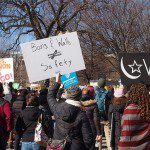When “Breaking News” interprets our shows, when Wolf Blitzer appears to report on an event unfolding before our very eyes, and when the images of destruction flash upon the screen, nearly every Muslim has the same reaction — dear Lord, please don’t be a Muslim.
Unfortunately, while the American public may be developing a tolerance of mass shootings by white men and police killings of innocent children, the hysteria induced by Muslim-Islamic-Jihadist-etc. terror never fails. Regardless that right-wing groups and individuals perpetuate more domestic attacks in the U.S., the fact remains that any act of widespread and public violence is immediately followed with suspicion of Muslims.
Stories lambasting Muslims don’t even have to be true. Following the attacks of September 11, stories abound of terrorist sleeper cells waiting to strike throughout the United States, yet no evidence was ever actually produced to prove such conspiracies. These types of stories still make the headlines as the U.S. confronts ISIS around the world.
The risk of hot takes and rapid-fire reporting getting it wrong about terrorism isn’t a post-9/11 phenomenon. The most notorious media blunder goes to the Oklahoma City Bombing in 1995. Prior to Timothy McVeigh’s arrest for the bombing, a mere two days after the attack, the media painted the bombing as Islamic terrorism, with the Wall Street Journal referring to it as a “Beirut-style car bombing.”
The New York Times briefly highlighted the link between Oklahoma and the Waco, Texas compound attack, but then shift to suspicion of “Islamic militants” and men that are “Middle Eastern in appearance.” Within hours, the media had latched onto the idea that the attack was perpetrated by Muslims from the Middle East, despite getting very little information from law enforcement.
Media outlets brought in experts who had spoken on news networks during the 1993 World Trade Center Bombings to reiterate concerns of Middle Eastern terrorism.
Unfortunately, these blunders have the potential to cause significant harm. On the day of the Oklahoma City Bombing, Ibrahim Ahmad was traveling from Oklahoma City to his home country of Jordan when he was interrogated by the FBI in Chicago and again by British authorities in London before finally being arrested in connection to the bombing. Fortunately, he was released shortly thereafter as it became clear the attack was a product of right-wing terrorists.
Hot takes and breathless commentary have never been kind to Muslims or vulnerable populations broadly. What is most frightening is the deliberate attempt by the Trump administration to encourage negative stereotypes of minorities, particularly illegal immigrants. In establishing the Victims of Immigration Crime Engagement (VOICE), Trump sought to engage in 1984-esque tactics to fuel hatred and hysteria towards Latinos.
Though conservatives may claim Trump is being precise in his attacks on illegal immigrants, social science research has long chronicled the negative effects of blanket racial statements like the ones in which Trump and his administration engage regularly.
With the writing of a hot take comes all the internalized and implicit biases of the author, and though we would all like to consider ourselves transcendent beyond negative stereotyping, empirical evidence says otherwise. Ancient wisdom is making a comeback, and

it may do us well to reflect on the virtues of silence expounded by the Prophet Muhammad, or the practice of placing stones in the corner of the mouth like Abu Bakr as-Sadiq once did.
A little reflection and contemplation may well cause us to wake from the slumber we’ve been in and even atone for the errs we’ve committed (we can still fix 2016, it’s never to late). However, it looks as though the news will come quicker rather than slower, and the window in which a response can be offered will continue to shrink.
What are we to do then, when stretched between the wisdom of reflection and the necessity of reaction?
Charles M. Turner is a PhD student in Political Science at the University of Utah. His research focuses on minority politics, particularly the inclusion of religious minorities in American democracies. Prior to continuing his studies, he served as the Muslim Life Coordinator at the University of Richmond, Government Teacher for the Madina School of Richmond, and a member of the Civic Outreach Committee at the Islamic Center of Virginia. His column appears in Altmuslim every third week of the month.













